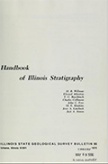Historical:Desmoinesian Series
Chronostratigraphy: Paleozoic Erathem >>Pennsylvanian Subsystem >>Desmoinesian Series
Allostratigraphy: Absaroka Sequence
Authors
M. E. Hopkins and J. A. Simon
Name Origin
The Desmoinesian Series of the Pennsylvanian System (Keyes, 1893, p. 86-114) is named for the Des Moines River in Iowa, along which the strata of the series are exposed.
Type Section
No specific type section was designated.
Stratigraphic Position
In Illinois the Desmoinesian includes all of the Spoon and Carbondale Formations of the Kewanee Group and the lower part of the Modesto Formation of the McLeansboro Group -- up to the top of the Trivoli Sandstone Member (Willman et al., 1967) (fig. P-2). The Desmoinesian is the most widely developed series of the Pennsylvanian in the United States.
Fossils
Fusulinids are abundant in many of the limestones in Illinois (Dunbar and Henbest, I942), and the Desmoinesian is the Fusulina Zone. That genus is confined to the Desmoinesian Series, except for the one reported occurrence in Atokan rocks. Several other invertebrates, such as Mesolobus, Chaetetes, and Prismopora, are seldom found above the top of the Desmoinesian, and certain of their species are confined to this series. The exact upper boundary is difficult to determine in much of the Illinois Basin because an interval at the top of the Desmoinesian and the base of the Missourian is barren of fusulinids.
Floral Zones 9 (Neuropteris rarinervis) and 10 (Neuropteris flex uosa and Pecopteris spp. ) of Read and Mamay (1964) are included in the Desmoinesian Series. In Illinois the series contains the thickest, most widespread coals, the spores of which are dominated by Lycospora. That genus suddenly disappears at the top of the Desmoinesian. Thymospora pseudothiessenii, which appears in the bottom third, also disappears at the top of the Desmoinesian. Densosporites occurs only in the lower half of the Desmoinesian, and Schopfites is diagnostic of approximately the middle third. There is a marked change in the spore flora at the Desmoinesian-Missourian boundary.
References
DUNBAR, C. O., and L. G. HENBEST, 1942, Pennsylvanian Fusulinidae of Illinois: Illinois State Geological Survey Bulletin 67, 218 p.
KEYES, C. R., 1893, Geological formations of Iowa: Iowa Geological Survey, v. 1, p. 11-144.
READ, C. B., and S. H. MAMAY, 1964, Upper Paleozoic floral zones and floral provinces of the United States: USGS Professional Paper 454-K, p. K1-K35.
WILLMAN, H. B., et al., 1967, Geologic map of Illinois: Illinois State Geological Survey.
ISGS Codes
| Stratigraphic Code | Geo Unit Designation |
|---|---|

